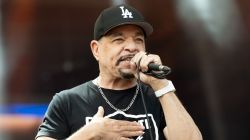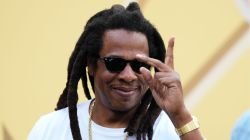The story of Dilated Peoples began in the ’90s, but the trio officially introduced themselves on May 23, 2000 when they dropped their debut album The Platform. Two decades later, the critically acclaimed LP remains beloved by fans and represents an important chapter in the Los Angeles underground Hip Hop scene.
With Evidence, Rakaa Iriscience and DJ Babu’s album celebrating its 20th anniversary, HipHopDX caught up with Ev for a look back at this pivotal project in his career.
The veteran MC/producer shares his thoughts on Dilated’s original debut (the shelved Imagery, Battle Hymns & Political Poetry), recalls signing with Capitol Records and provides a self-evaluation of his work on The Platform. Ev also explains why the LP has an independent feel despite being released on a major label and reflects on the album’s legacy.
Dilated’s 1st Attempt At A Debut: Imagery, Battle Hymns & Political Poetry
Evidence: The real one’s still not out there. I see all these bootlegs. They’re like compilation versions of it. I think that’s for the best. I listen back to that. I love the innocence of it, but yeah, I just wasn’t ready so it’s kind of a blessing it was shelved in my eyes. We were signed to DJ Lethal through House of Pain to Immortal Records through Epic Records. It was a production to a subsidiary to a major. It probably wasn’t the best thing.
How Dilated’s Dynamics Changed From Imagery To The Platform To Expansion Team
Evidence: I think [the early days were] different for me than for Rakaa and probably different for Babu. The first two Babu wasn’t an integral part of it yet. He kind of came into it. The third one, Expansion Team — I say the third one but it’s really like our second — it was the first time we worked as a trio. Like all our ideas are being flushed out as three people. The other two are more Rakaa and I, so that’s probably the difference between those.
The idea behind The Platform, it’s Wu-Tang inspired … These are individuals who are doing their solo thing who are coming together to have this platform and make something bigger called Dilated Peoples.
And then keep in mind for Imagery, I wasn’t even 18 yet so I had to have my mom sign the contract and do all that kind of shit.So, I’m a lot younger. Now, it doesn’t matter if I’m this age and Rakaa’s that age because we’re all grown-ups, but at that time, shit — I was a little baby boy. So to me, it was everything new, fresh, take it head on. You’ve got the confidence and just that innocence where you just don’t give a shit. It’s just what the situation was whereas Rakaa might’ve been a little more calculated.
The Platform: An Indie Album Released By A Major Label
Evidence: The album’s funny because it was done prior to us getting our deal. We started in ’97 with the “Third Degree” 12-inch that had “Confidence” and “Global Dynamics” on it I believe. And then in ’98, we dropped “Work The Angles.” That led to shows getting popping and all the industry coming out and we’ve got a little bidding war going. Then we did the deal in ’99 and dropped in 2000. I think with the exception of maybe “Ear Drums Pop,” “Ear Drums Pop Remix” and “The Shape of Things to Come” — one or two other songs we added to it — but that was a done deal already. That’s why that album is dope to because it’s really the true sense of an independent record coming out on a major.
We broke a thing. At that time, a lot of people, they would have their underground music and then they’d get a deal and then they cut a new album. That one, we didn’t budge. We just were like, “This is what we have.” I’ve got this song “Last Line of Defense” on that album. I went to D&D [Studios] one night with Alchemist and recorded it really fast and the engineer threw up a rough mix because we were on an hourly clock and that’s what you heard. It was never mixed or anything and that was the feel of that record. It was just kind of what happened at the end of the session at the end of the day is what you got. There really was no overthinking, over anything.
For that reason, it just has a feel. Whether you like, don’t like it, or anything in between, you just can’t deny the innocence of it. We were just cutting records and putting it together and here’s your album. So, I love the album for that reason mostly. Our second album, Expansion Team, was the first album we made in a studio all the way on a major label, so to me, that’s our first album in a weird way.
Signing With Capitol Records
Evidence: I always lean towards [Rakaa]. My mom, rest in peace, she loved me being around him. She just loved Rakaa, so it would be like, “I’m going out tonight mom.” “Is Rakaa going to be there? OK!” As long as Rakaa was there, she was happy. So, it was like he always played big brother but even low-key father sometimes, like a protector type. He was always the person who would do a lot of homework and stuff. On that side, on the business side, he might’ve overthought where I was going more with my gut and what I felt.
We always came to an agreement I guess democratically. Two versus one is a weird thing because two people can want [something] and the other one loses sometimes but that’s just how it was. We would always vote and always go with our feelings. Usually, it was all three in unison, sometimes two and one. The bidding war was really interesting in the sense that we weren’t making any kind of pop music whatsoever. We’re really about sticking to our guns. We were on ABB Records putting out vinyl at Fat Beats, selling out of vinyl really fast, doing these … I guess now looking back on it, it felt big at the time but small shows. Things at the Roxy [Theatre] and those kinds of 500 cap room type vibes sold out, mad people can’t get in. That vibe, so I guess it was attractive to the labels.
What I liked about the industry at that time is the industry hadn’t really figured out how to get their foot on rap music yet. They hadn’t figured it out. There were hit records, but there was no two hit records out at that time that were the same. There wasn’t a formula that made a hit record. Either it was catchy and it worked or it didn’t. So, for them, they didn’t really know what the fuck they were doing. They just knew that there was some success behind this thing independently and that maybe they should get behind and that they could grow it somehow, one way or another. But there was no real answer or real if you do this kind of song the shit’s going to pop type vibe. Because rap wasn’t all the way pop yet even though it had a lot of pop things that made pop impressions, it really wasn’t hands down across the board like it is now.
I think labels were interested in the success we were having and why we were having it on our own terms. We met with Jimmy Iovine. We met with Craig Kallman or whatever his name is. Not to disrespect — I don’t know his last name, but it was Atlantic [Records]. We met with everybody except Puffy and Def Jam. I think we met with everybody else. Capitol, there’s a guy Ron Laffitte, who was an A&R who I liked. Their attitude, or perceived attitude, to us at the time was “We don’t have rap. We don’t even have an ‘urban department.’ All we have is Beastie Boys and they’re on their own imprint, so if you come here and you want to put out your album the way you want to put it out, we’ll do that — and we’ll pay more.” So, we figured that was the best choice for us going to a label that was really inexperienced with rap at the time.
It just really had no interest in rap at the time and we could kind of go there and do what we wanted more than going to a place that had success and a pattern of how to have success.
The Initial Reception To The Platform
Evidence: I think it just depends on the side you were looking at in from. So from all our homies who had been watching us build this shit up to go around the town and see our album on SNIPES, on construction sites across the city, on billboards and videos hitting … Even if it wasn’t daytime MTV, but MTV. And even if it was just Rap City, BET and moving up and doing bigger shows. We were touring with Jurassic 5 a lot, moving from The Roxy to The Palladium or selling out House of Blues now and stuff like that. I think you were proud of what we were doing and you saw an upward trajectory.
If you were on the industry side, I think when we came out our first week, I don’t know if those numbers are still available, but I think we sold somewhere between 25,000-30,000 records, which for us was like, “What the fuck? 30,000 people just went out and bought our shit in a week! Like, what?” But on the industry side, for all the money that had been invested, people were doing 100,000, 150,000, 200,000 their first week. I could imagine from a stockholder’s standpoint, or an industry side, this was something that was doing OK and it still had room to go.
20 Years Later: Evidence’s Self-Assessment Of His Work
Evidence: I think some of it passed the time test and some of it didn’t as far as me being able to play that in 2020 right now and just be like, “Yes!” But the thing I love the most about it is, at the time, when I did whatever rhyme I did or we finished whatever song we finished, I thought it was the best shit. I thought it was so fucking good. I love the arrogance and confidence and how much I believed in what we were doing at the time. That’s something as you get older, you learn more. But at that time you couldn’t tell me shit, and I love how confident I was in what I was doing.
I would say a line sometime and then I’d just put a big ass break after that line just to be like, “Take that, think about that for a minute.” I’m not even going to come back in on the next bar. I’m going to wait for the next snare to come back in. Because I just thought what we were doing was so dope and even if it doesn’t play back to me like that now, I still love the energy of that. It just reminds me of being young and not giving a fuck and believing in what I do.
The Platform’s Legacy
Evidence: It was a special time if you were there for sure, undoubtedly. The tours, selling out rooms across the world, not just America. Going to Europe, being groundbreaking over there. We had a really live stage show. We were influenced by Cypress Hill and all the people we were around who weren’t doing little clubs. They were doing arenas and stadium type shit. So, we got to see possibilities and that energy.
I love what it represents. Where it sits I think that’s more for other people to decide more than me, but I think if you look back to the late ’90s and early 2000s of the underground movement that started from Fat Beats and started from record stores and selling vinyl and the groups that got the deals from that time, I think we’re a prominent piece of that puzzle.
I think we inspired a lot of people to show that doing it yourself can lead to bigger shit. Our second album, I don’t know what it is today, it’s probably really close to gold. But that sold 300,000-400,000. We kept moving up. And “Worst Come To Worst” was our biggest song. That was on our next album, so it was an evolution happening, which was great. It wasn’t like The Platform happened and then we just died off. We finished our whole contract with Capitol, four albums.
Revisit The Platform below and look out for DX’s retrospective with DJ Babu.










I’ve always been a fan of these guys.
Directors of Photography was a worthy return. i hope they can do another in time.